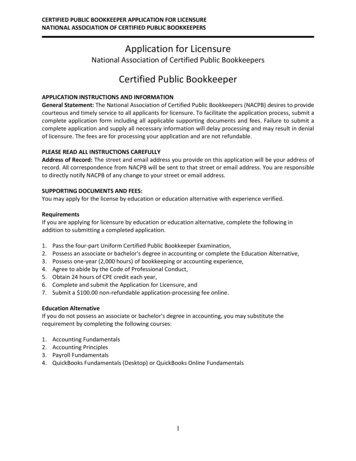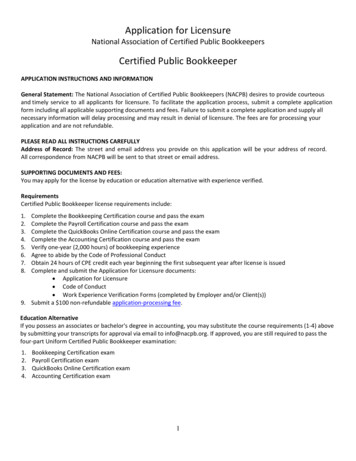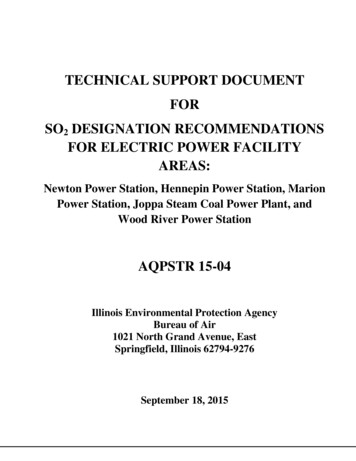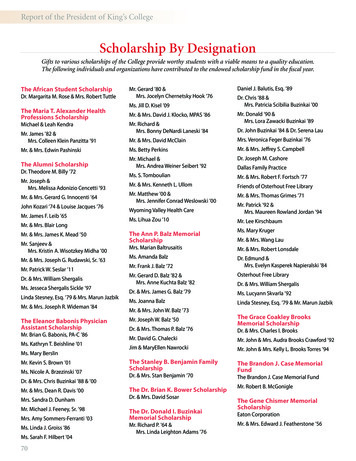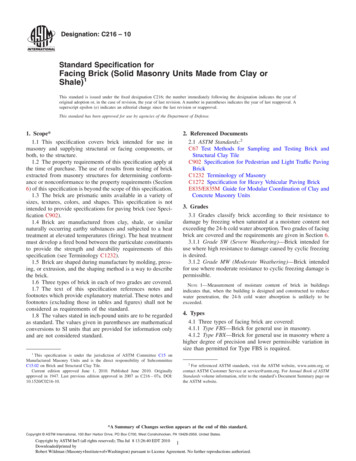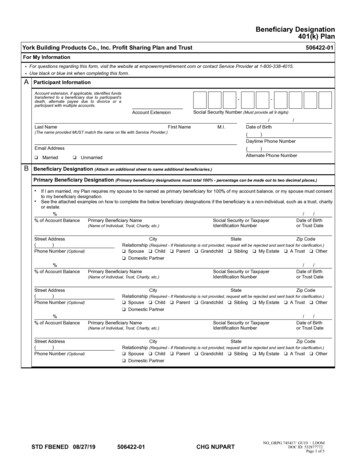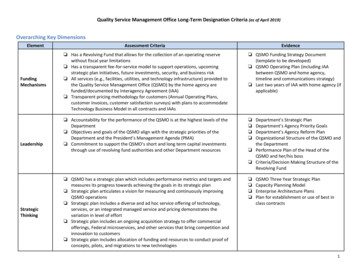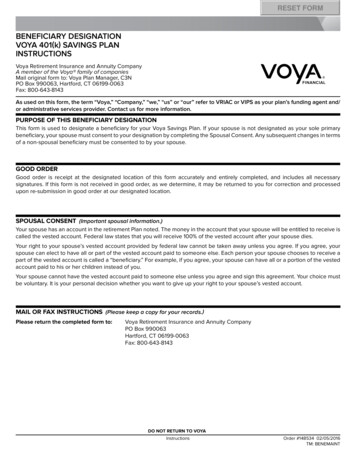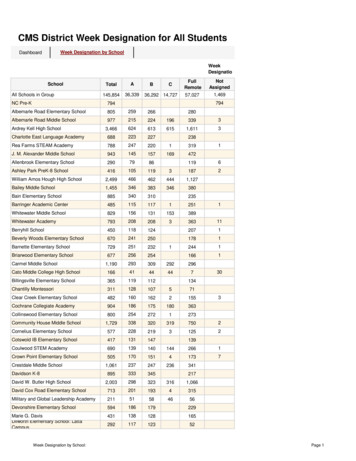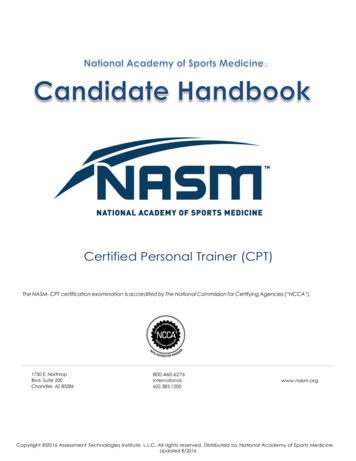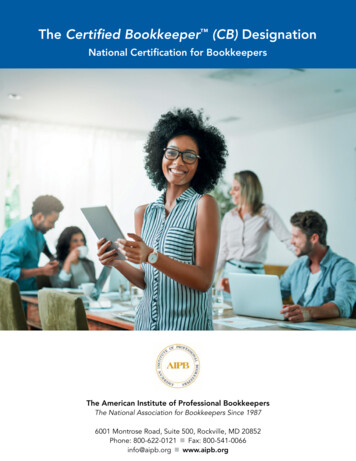
Transcription
The Certified Bookkeeper (CB) DesignationNational Certification for BookkeepersThe American Institute of Professional BookkeepersThe National Association for Bookkeepers Since 19876001 Montrose Road, Suite 500, Rockville, MD 20852Phone: 800-622-0121 n Fax: 800-541-0066info@aipb.org n www.aipb.org
Benefits of CertificationThe following statistics are from a 2019 survey of CBs by Lewis & Clark, Raleigh, NC:n 90%of all CBs, employed and freelance, recommend certification to other bookkeepers.For employed CBsn 49%of employed CBs say that certification enhanced their standing with their employer.n 54%of CBs have gotten a new job, been promoted or been given higher-level responsibilitiessince being certified; 84.3% of these say certification was important to their new status.n 81%of CBs who interviewed for anew job since becoming certifiedsay that certification was important inobtaining the interview.n 59%of CBs received a raise afterbecoming certified—75.5% of thesesay certification was important ingetting the raise.n 46%of CBs say that being certifiedhas enhanced their self-image.n 61%of CBs say they gained newknowledge preparing for certification.n 55%of CBs say that preparing forcertification filled in gaps in their knowledge.n 58%of CBs say that being certified has increased their self-confidence.Freelance CBsn 48%of freelance CBs say they have raised their rates to clients since becoming certified.n 37%of freelance CBs say that being certified helped them gain new clients.n 55%of freelance CBs say that being certified enhanced their standing with clients.n 47%of freelance CBs say that being certified has enhanced their self-image.n 51%of CBs say they gained new knowledge preparing for certification.n 57%of CBs say that preparing for certification filled in gaps in their knowledge.n 50%of CBs say that being certified has increased their self-confidence.n 82%of freelance CBs say that they have utilized certification for marketing purposes.What is the Certified Bookkeeper designation?The Certified Bookkeeper designation assures the level of knowledge and skill needed to carryout all key functions through the adjusted trial balance, including basic payroll, for firms of up to100 employees.Certification requires passing an examination, proving 2 years’ experience in bookkeeping andsigning a code of ethics. To retain certification, you must meet ongoing continuing professionaleducation requirements.2
How to Become a Certified Bookkeeper (CB)To become a Certified Bookkeeper, you must meet three requirements:1. Pass the four-part national certification exam. Parts 1 and 2 are given at any of 300 PrometricTest Centers. Parts 3 and 4 are open-book tests that come with your workbooks. All tests aremultiple-choice.2. Sign a Code of Ethics. See pages 10-11.3. Submit evidence of at least 2 years’ full-time bookkeeping experience or 3,000 hours’ parttime or freelance experience before or after you pass the national exam. You have 3 years to fulfillthis requirement from the date that you pass the exam. See the “Evidence of Experience” form onpage 9.Use of CertificationObtaining the Certified Bookkeeper designation,conferred by the American Institute of ProfessionalBookkeepers, is voluntary. Those persons or organizations that choose to include the Certified Bookkeeperdesignation as a condition of employment or advancement do so of their own volition and must determinefor themselves whether the use of such a certificationprocess, including its eligibility and recertification andany other requirements imposed by such persons orentities, meets their respective needs and complieswith any laws applicable to them.How to Register for theCertified Bookkeeper (CB) DesignationTo register, file the application on pages 7–8. Allow4 weeks for processing.Once your application is processed, you have one yearto complete any one part of the certification exam.If you do not complete any one part within one year,you must register again.If you do not pass all parts of the exam within threeyears, you must re-register and take all tests again.3
Registration Fee for the Certified Bookkeeper DesignationThe nonrefundable registration fees, payable to AIPB, are as follows:AIPB-Member registration fee 25Nonmember registration fee 60The Four-Part Certified Bookkeeper ExamThe Certified Bookkeeper ExamTimeFeePassingGradePart 1 – At Prometric: Adjustments and Error CorrectionTest 1: A ccruals, Deferrals and the AdjustedTrial BalanceTest 2: C orrection of Accounting Errors and theBank ReconciliationPart 2 – At Prometric: Payroll and Depreciation75% 10075%2 hours 10075%75%Included in the workbook Mastering InventoryNo limitNo fee70%Part 4 – Back-of-the-workbook exam: Internal Controlsand Fraud PreventionIncluded in the workbook Mastering Internal Controls andFraud PreventionNo limitNo fee70%Test 1: PayrollTest 2: Depreciation2 hoursPart 3 – Back-of-the-workbook exam: InventoryRetestsIf you do not pass a part of the national exam, you can retake just that part after a 30-day waitingperiod. For example, if you take Part 2 and pass Payroll but not Depreciation, you can retake justDepreciation. The fee for retaking one part is 60. There is no fee for retaking a back-of-the-workbook exam.GI Bill reimbursement: Military personnel, veterans and some dependents of deceased veteransmay be eligible for reimbursement of exam costs (https://benefits.va.gov/gibill/).Applicants With DisabilitiesAIPB complies fully with the Americans with Disabilities Act (ADA). If you require reasonableaccommodation for the exam, please call 800-622-0121 before submitting your “Application for theCertified Bookkeeper (CB) Designation.”Obtaining Your Certified Bookkeeper (CB) DesignationIf you pass all tests, meet the experience requirements, and sign the AIPB Code of Ethics, you willreceive your certificate within 2 weeks of passing the last test.4
Taking Tests at PrometricAlthough the tests at Prometric are listedas “Part 1” and “Part 2,” you can takethem in any order. We recommendscheduling and sitting for Part 1 beforescheduling Part 2.All tests at Prometric are given on a PC.Each question is multiple choice, so yousimply select a, b, c, or d. Prometricprovides an optional tutorial before youstart. Your test score is printed out foryou at Prometric as soon as you completethe test.Prometric Test Center RulesHere are the rules for Prometric Test Centers:1. You must present two forms of I.D.; one with a photo and both showing the same name andsignature (i.e., not one with your maiden name and one with your married name). Acceptable formsof Primary I.D. are: valid state driver’s license, valid passport, state I.D. card, military I.D. card,student I.D. card. Acceptable forms of Secondary I.D. are: credit card, ATM card, green card.2. Nonprinting, nonprogrammable, self-powered calculators may be used during the tests.3. No test materials, documents or memoranda of any kind may be taken from test rooms.4. The name/I.D. number of anyone suspected of irregularities is reported to AIPB.5. You may take the scheduled part of an exam only on the day and time scheduled.Retaining Your Certified Bookkeeper (CB) DesignationTo keep your Certified Bookkeeper designation, you must acquire over every 3 years, a total of60 Continuing Professional Education Credits (CPECs), starting from the date you are certified.The fee for registering CPECs is 3 per CPEC. When you are certified, you will receive completeinformation about CPECs, as well as abundant free sources for earning them.Getting StartedAIPB offers the six self-study course workbooks shown below to prepare for each part of the nationalcertification exam.There is a double-quiz at the end of each workbook section to make sure you master the skills andknowledge you just learned. We strongly urge you to write the answers on a piece of paper—not inthe workbook—so you can practice the quizzes over and over. The questions on the national exam aresimilar to, but never duplicates of, the questions in the workbook quizzes. So, if you do and re-do thequizzes at the end of each workbook section, you should have no difficulty with the national exam.5
Preparing for the Four-PartNational Certified Bookkeeper (CB) ExamThe Six CB Prep Course Workbooks4. Mastering DepreciationSection 1. Depreciation for bookv. tax purposesMasteringSection 2. GAAP depreciationDepreciationSection 3. The straight-linemethodSection 4. The units-ofproduction methodAIPB Section 5. The declining balancemethodSection 6. The sum-of-the-years’-digits methodSection 7. Depreciation under federal tax rulesSection 8. Depreciating vehicles under MACRSeciationMastering DepreciationMastering Depr1. Mastering Adjusting EntriesSection 1. Accrual v. cash basisSection 2. Accrued revenueSection 3. Accrued expensesSection 4. Unearned revenueSection 5. Prepaid (deferred)expensesSection 6. Other adjusting entries(depreciation, bad debt, etc.)Section 7. From the unadjustedtrial balance to the financial statementsAIPBAIPB36ISBN 97819387410The double-quizat the end ofeach sectionhelps to ensureyou master theinformation.Suite 5006001 Montrose Road20852Rockville, Maryland00 55955900 10 3 69 7 8 19 3 8 7 42. Mastering Correction of Accounting ErrorsSection 1. Where accountingerrors occur—how to find themSection 2. The bank reconciliationSection 3. Using the trial balanceto find errors Section 4. Correcting currentperiod accrual errorsSection 5. Correcting currentperiod deferral errors5. Mastering InventorySection 1. Merchandise inventorySection 2. The perpetual methodSection 3. The periodic methodSection 4. Weighted avg. costingSection 5. FIFO costingSection 6. LIFO costingSection 7. The lower of cost ormarket (LCM) rule3. Mastering PayrollSection 1. Employees v.nonemployeesSection 2. Federal v. state lawsSection 3. Paying employeesunder federal lawSection 4. Required payroll dataSection 5. Form W-4 and statewithholding formsSection 6. Withholding anddepositing taxesSection 7. Completing federal reporting formsSection 8. When wages are taxableSection 9. Other federal and state requirementsSection 10. Journal entries for payroll6. Mastering Internal Controls and Fraud PreventionSection 1. How employees stealnoncash assetsSection 2. How to preventemployee theft before it startsSection 3. Preventing check fraud Section 4. Preventing credit-cardfraudSection 5. Preventing vendorcheatingSection 6. Con schemes and other scams againstbusiness6
Application for the Certified Bookkeeper (CB) Designation—Part 1Complete Parts 1 and 2 and return to:Certified Bookkeeper Program, American Institute of Professional Bookkeepers6001 Montrose Road, Suite 500, Rockville, MD 20852Tel. 301-770-7300 Fax 301-770-5626 Email patricia.beltran@aipb.orgPlease PrintFiling DateDate of BirthMother’s Maiden Name/ // / Mr. Ms.Mo.DayYearMo.DayYearLast NameFirstHome AddressM. I.Work AddressCompanyNumber and t. No.Number and � Suite ��Zip CodeState Zip CodeI would like correspondence sent to my home address work addressBusiness Phone-Ext.-Home Phone-Preferred E-mail Address (required)-My present bookkeeping position: Company bookkeeper Freelance bookkeeper M y Member I.D. number is (can be found on your AIPB Membership Certificate,renewal notice, or in the email you receive each month for the latest issue of The General Ledger). I am not an AIPB member. You will receive an I.D. number upon acceptance of this application. I am not a member, but I am enclosing my membership enrollment form (see page 15). Your I.D. numberwill be sent to you.Statement of experience: I have completed my experience requirements and enclosed the forms (page 9). I have completed some of my experience requirements and enclosed the form (page 9) with thisapplication. I understand that I must submit my remaining experience requirements when I complete them. My experience form (page 9) is being sent under separate cover to the address above. I will complete my experience and submit my experience form after I take the certification exam.I certify that I have read and understand the instructions and that the information given by me is correct.I further certify that I have read the Certified Bookkeeper’s Code of Ethics (pages 10–11) and that I understand and accept it. I understand that knowingly providing false statements herein or lack of compliance withthe Certified Bookkeeper’s Code of Ethics are grounds for rejection of this application. I understand that theliability of the American Institute of Professional Bookkeepers and its agents is limited to application fees only.Signature of ApplicantDateBE SURE TO COMPLETE PART 2 OF THE APPLICATION ON THE NEXT PAGE.7
Application for the Certified Bookkeeper (CB) Designation—Part 2Choose one of the following: A pplication (pages 7–8) and registration fee enclosed. (Allow 3 weeks for processing.) A pplication (pages 7–8), registration fee and workbooks fee (below) enclosed. O nly the payment for the course workbooks selected below enclosed. (Allow 7–10 days for delivery.)Registration Fee and Workbook Order FormMemberprice R egistration Fee (nonrefundable). 25 Mastering Adjusting Entries. 39 M astering Correction of Accounting Errors. 39 Mastering Payroll. 49 Mastering Depreciation. 49* Mastering Inventory. 49* Mastering Internal Controls and Fraud Prevention. 29Subtotal * The Final Exam in the back of this workbookis used for the national certification exam. 6 s/h per book My Total Payment is C heck or money order enclosed payable to “AIPB” C harge my: V isa MasterCard A MEX DiscoverSignatureApplicant’s NameCompany (if applicable)AddressCityStateZip8Free shippingon orders of6 booksMoneyback GuaranteeCCV2 Number (on back of most cards)Cardholder’s Name 49 49 59 59 59 39 Become a memberand get AIPBMember Discounts.See Special Offeron page 12.All course workbooks are fully guaranteed. If not satisfied,return course workbook(s) within 30 days in good condition fora 100% refund. Application fees, however, are nonrefundable.Credit Card NumberExpiration DateNonmemberprice 60
Application for the Certified Bookkeeper (CB) DesignationEvidence of Experience—Part 3Complete and return to: Certified Bookkeeper Program, American Institute of Professional Bookkeepers6001 Montrose Road, Suite 500, Rockville, MD 20852Tel. 301-770-7300 Fax 301-770-5626 Email patricia.beltran@aipb.orgTYPE OR PRINT LEGIBLY. HAVE CURRENT/FORMER SUPERVISOR OR CLIENT SIGN/INITIAL AS NOTED. I am an employee. I am a freelancer.ApplicantSupervisor/Owner (if employed) or Client (if freelance)NameNameName while employed (if different)Company/Organization nameStreet addressStreet addressCity/State/ZipCity/State/ZipPhone numberPhone numberE-mail addressE-mail addressEmployer’s or Client’s verification (Initial)A. Dates of full-timeemploymentFrom (mo/day/yr)To (mo/day/yr)B. Dates of part-timeemploymentFrom (mo/day/yr)To (mo/day/yr)If part-time, number of hours worked per week:Duties performed (at least three must be checked): bookkeeping (basic) accounting (basic) preparing the bank reconciliation recording general journal entries recording accounts receivable recording accounts payable preparing payroll(s) reporting federal or state payroll taxes recording depreciation for book purposes recording depreciation for tax purposes recording inventory r ecording end-of-period adjustments and costing outinventory m aintaining and controlling end-of-period inventorybalances p reparing part of a trial balance creating the adjusted trial balance maintaining sales-tax-payable and filing end-of-periodforms and schedules operating accounting software—inputting transactions or general journal entries or adjustmentsfor the trial balance preparing the income statement preparing the balance sheet handling collections making collection calls and maintaining paymentsschedule budgeting reporting end-of-period budget v. actual results preparing tax returns for a business other (describe) other (describe) other (describe)These statements are true and accurate according to my records or to the best of my knowledge.Applicant signatureDateEmployer or Client signature9Date
The Certified Bookkeeper Code of EthicsComposition of the Code of Ethics for Certified BookkeepersThe Certified Bookkeeper’s Code of Ethics comprises a Preamble, Rules of Ethics and interpretationsof the Rules of Ethics.PreambleAs a member of the accounting profession, the Certified Bookkeeper has responsibilities to anumber of parties. Which parties the Certified Bookkeeper has obligations to depends on whetherthe Certified Bookkeeper is employed as an internal bookkeeper for a particular entity or is workingas a public bookkeeper for clients.As an internal bookkeeper for an entity, the Certified Bookkeeper has responsibilities to 1. the employer;2. society; and3. the bookkeeping and accounting profession.As a public bookkeeper, the Certified Bookkeeper has responsibilities to 1. the client;2. society; and3. the bookkeeping and accounting profession.This Code of Ethics is applicable to all Certified Bookkeepers.Rules of Ethics for Internal BookkeepersInternal Certified Bookkeepers have the following obligations:Obligations to the employer1. To provide the employer with high-quality professional services.2. To remain current and up to date on matters relating to the bookkeeping profession. Only bybeing up to date can the Certified Bookkeeper provide the employer with high-qualityprofessional services.3. To protect the confidence of all aspects of the employer’s business or, in the case of anonbusiness entity, of all matters relating to the employer.4. To be loyal to the employer and work in the best interests of the employer.5. Not to engage in any activity that is in conflict with the employer’s interests.6. If asked by the employer to do something not in accordance with the Certified Bookkeeper’sprofessional standards, to attempt first to resolve the issue within the employer’s organizationalstructure or, if unable to resolve the situation, to resign and seek employment elsewhere. At notime should the Certified Bookkeeper report this situation to an outside group or agency unlessrequired to by law.Obligations to society1. Certified Bookkeepers employed as internal bookkeepers should at all times conduct themselveswith integrity.10
2. Certified Bookkeepers employed as internal bookkeepers should, when requested or required,provide government agencies or bodies with information that, to the best of their knowledge, iscorrect.3. Certified Bookkeepers employed as internal bookkeepers should be objective in their professional judgments, actions and interpretations.Obligations to the bookkeeping and accounting professions1. Certified Bookkeepers employed as internal bookkeepers should refrain from any act that wouldbring discredit to the bookkeeping or accounting profession.2. Certified Bookkeepers employed as internal bookkeepers should share new, general,nonproprietary developments in accounting with other members of the bookkeeping andaccounting professions.Rules of Ethics for Public BookkeepersPublic Certified Bookkeepers have the following obligations:Obligations to clients1. To provide clients with high-quality professional services.2. To remain current and up to date on matters relating to the bookkeeping profession. Only bybeing up to date can the Certified Bookkeeper provide the cl
The Certified Bookkeeper designation assures the level of knowledge and skill needed to carry out all key functions through the adjusted trial balance, including basic payroll, for firms of up to 100 employees. Certification requires passing an examination, proving 2 years’ experience in bookkeeping andFile Size: 1MB
